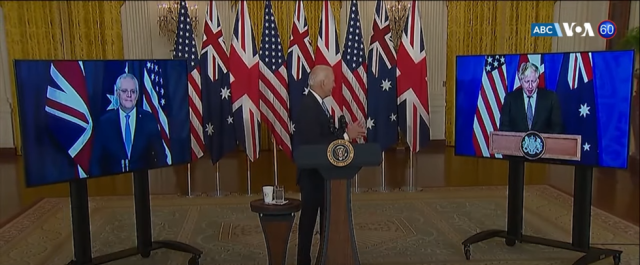The United States, Great Britain and Australia united to protect their interests, and France was indirectly affected. Yesterday, on September 16, the BBC news agency reported that the three states have concluded a historic security pact.
The new military alliance was named AUKUS (Australia, United Kingdom, United States) and was officially created to "protect and defend common interests in the Indo-Pacific region". The joint statement by Australian Prime Minister Scott Morrison, British Prime Minister Boris Johnson and US President Joe Biden does not mention other countries, but anonymous sources in the White House have already stated that the new military alliance was created to counter the influence of the People's Republic of China.
The AUKUS Pact through the eyes of the British
The AUKUS Pact provides for cooperation in the creation of defense technologies, including autonomous weapons systems based on artificial intelligence, quantum technologies and computer technology. According to the agreement, Australia will have the opportunity to build nuclear submarines for the first time. To do this, the country broke the "deal of the century" with France, which was already on the verge of collapse.
The US will supply Australia with highly enriched uranium for submarines, since Australia has agreed not to produce nuclear fuel. This means that Australia will become the seventh country to have nuclear submarines in service, or the eighth if Brazil is ahead of it.
China reacted negatively to the new military alliance. In particular, the representative of the Ministry of Foreign Affairs of the People's Republic of China, Zhao Lijian, said: "The United States, Great Britain and Australia are participating in cooperation in the creation of nuclear submarines, which seriously undermines regional peace and stability, exacerbates the arms race and harms international non-proliferation efforts." The Chinese Embassy in Washington accused the three countries of " Cold War mentality and ideological prejudices." France was also dissatisfied with the new pact — for example, Foreign Minister Jean-Yves Le Drian called the termination of the contract for the joint construction of submarines with Australia a "stab in the back".

